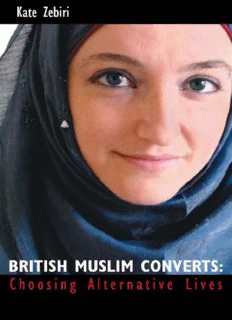
British Muslim Converts: Choosing Alternative Lives PDF
Preview British Muslim Converts: Choosing Alternative Lives
prelims.qxd 9/13/07 1:01 PM Page i BRITISH MUSLIM CONVERTS prelims.qxd 9/13/07 1:01 PM Page ii prelims.qxd 9/13/07 1:01 PM Page iii BRITISH MUSLIM CONVERTS Choosing Alternative Lives KATE ZEBIRI prelims.qxd 9/13/07 1:01 PM Page iv A Oneworld Book Published by Oneworld Publications 2008 Copyright © Kate Zebiri, 2008 All rights reserved Copyright under Berne Convention A CIP record for this title is available from the British Library ISBN: 978–1–85168–546–2 Typeset by Jayvee, Trivandrum, India Cover design by Design Deluxe Printed and bound in Great Britain by Biddles Ltd, King’s Lynn Oneworld Publications 185 Banbury Road Oxford OX2 7AR England www.oneworld-publications.com NL08 Learn more about Oneworld.Join our mailing list to find out about our latest titles and special offers at: www.oneworld-publications.com prelims.qxd 9/13/07 1:01 PM Page v Contents Acknowledgements vii Introduction 1 Theory,methodology and fieldwork 5 1. Converts in the British context 17 Muslims in Britain 17 A briefhistory ofconversion to Islam,with particular reference to Britain 30 Converts vis-à-vis second- and third-generation Muslims: a comparative view 36 A profile ofBritish converts 40 2. The ‘double marginality’ofconverts 52 Conversion as social protest? 52 Converts in relation to born Muslims 60 Converts in relation to non-Muslim family and friends 71 A special role for converts? 82 3. A new identity? 88 National,racial and ethnic identity 95 Identity markers:language,dress,names,circumcision 101 Lifestyle changes 114 Continuity and discontinuity 127 Concluding remarks 135 prelims.qxd 9/13/07 1:01 PM Page vi vi Contents 4. Society and politics 144 Views ofBritish society and Western civilization 151 Sexual morality 160 Domestic and international politics 171 A new geopolitical orientation? 181 Concluding remarks 191 5. Women and men 198 H.ija¯band niqa¯b:eluding the male gaze 204 Social contact between the sexes 215 Marriage 224 Polygyny 235 Concluding remarks 241 Conclusion 248 Glossary ofArabic and Islamic terms 253 Bibliography 255 Index 269 prelims.qxd 9/13/07 1:01 PM Page vii Acknowledgements Firstly,a special thank you to all the interviewees,who gave up their time and often welcomed me into their homes,and without whom,of course,this book would not exist;also to all the friends,family,stu- dents and colleagues who kindly asked after the progress ofmy research.I am very grateful to the British Academy for their generous financial assis- tance which greatly facilitated this project,and to the School ofOriental and African Studies for giving me sabbatical leave in 2005–6. I would like to thank Aisha Masterton for her help with interviewing,for her active interest and moral support,and for the many tasks with which she helped me as research assistant;Yasmin Moll,who also provided very able research assistance;Philip Herlihy,for creating an extremely useful and user- friendly database for my interview material;and my brother Robert,whose intricate knowledge ofword-processing software was invaluable in the final stages ofpreparing the typescript.I am also indebted to those converts who were not part ofmy sample but who kindly helped,in one case by reading and commenting on sections of the typescript, in another by lending research materials,but mostly in conversations and email correspondence which increased my knowledge and understanding; Batool al-Toma and Yahya Birt deserve particular mention.I would,however,emphasize that any shortcomings in the present work are entirely my own responsibility. And finally, my deepest gratitude to my ‘other half’, David Stretch- Dowse,for his unfailing support – emotional,intellectual and practical – and for many enlightening conversations which were ofenormous help to me in conceiving and shaping this work. prelims.qxd 9/13/07 1:01 PM Page viii intro.qxd 8/31/07 2:41 PM Page 1 Introduction Western converts to Islam transcend the often invoked Islam- and-the-West dichotomy simply by virtue ofwho they are.It is becoming increasingly difficult for non-Muslims living in Western Europe and North America to maintain the image ofIslam as ‘for- eign’and ‘other’in the face ofthe growing numbers ofindigenous people who choose to embrace this religion.Among Muslims,there is evidence to suggest that converts are making a disproportionate contribution to the indigenization of Islamic practice,thought and discourse in the West.In relation to Western society,it is tempting to see Muslim converts as part ofa new counter-culture,in which a minority ofborn Muslims also participate, comparable to the so-called ‘conservative counter-culture’ in the US, a growing movement of young people in both evangelical and Catholic churches who reject premarital sex,alcohol and drugs. There are two themes which are central to this study:identity change, and converts as critics ofWestern society.1These themes are closely related, in that the aspects ofidentity which converts seek to change reflect aspects of mainstream society with which they are dissatisfied. For example, a woman who feels that she has been treated as a ‘sex-object’in a society which commodifies women’s bodies converts to Islam and modifies her dress in such a way that she can no longer be seen in that light.For those who come to Islam,conversion affects not just their beliefs and values but often their whole lifestyle;far from being confined to their inner,spiritual world,their 1 Although these themes are dealt with specifically in chapters 3 and 4, they are not confined to those chapters.
Description: